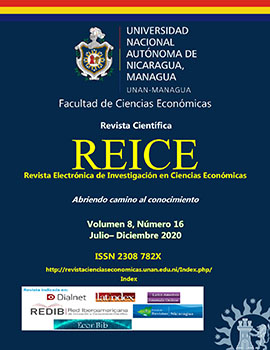Methodological Aspects Concerning Evaluation of the Financial Stability of Companies in the Crisis Economy Conditions
DOI:
https://doi.org/10.5377/reice.v8i16.10720Keywords:
methodology, equity, liquidity, financial stability, bankruptcy, integrated assessmentAbstract
The financial stability of a company is one of the most important criteria for assessing the situation of enterprises both for the current period and for subsequent periods of functioning. Of course, every enterprise wants to have business liquidity, otherwise the basis of entrepreneurship collapses; however, the purpose of doing business is to make a profit. An enterprise can make good profits, but at the same time have large liabilities, that is, debts. In this case, it is difficult to call the company financially stable. The onset of the economic crisis in the Russian Federation only prompts the conduct of such studies. Firstly, because it is necessary to understand how the situation in the country's economy as a whole affects a single enterprise, and secondly, what the prerequisites for this influence can be noticed in advance and how to try to prevent them. The relevance of this study lies in the fact that today in Russia there are a number of difficulties with assessing the status of organizations and their adequate comparison with reality. There are many different methods for assessing the financial condition and, in particular, the financial stability of a company. However, when choosing one of them, it is necessary to consider them in order to identify the shortcomings of their application to certain market conditions. Identification of these disadvantages of different theories will allow us to competently and reliably analyse the financial condition of various companies. It is also worth noting that this topic is relevant not only for the companies themselves. The presence of positive dynamics of financial stability indicators as an integral part of the financial condition of the enterprise is one of the most important bases of investment attractiveness. Therefore, not only a company itself is interested in such studies in the inside, but also other market entities from the outside.
Downloads
729
References
Kucherenko, S.A. (2014). A reliable assessment of the financial condition as an economic security factor of agricultural entities / S.A. Kucherenko, N.S. Zhminko // Science, education, society: trends and prospects. Materials of the International scientific-practical conference, in 5 parts. - LLC “AR-Consult”, M, 13-16.
Levkina, E. V., & Titova, N. Y. Methodological approaches to assessing the financial condition of small business. IOP Conference Series: Earth and Environmental Science, 272(3).
Levkina, E.V., & Nushtaykina, N.F. (2017). Analysis of equity as the main factor in the financial stability of a company. Karelian Scientific Journal, 3, 100-103
Olinichenko, K.V. (2015). Bankruptcy of enterprises and the system of criteria for their insolvency / K.V. Olinichenko, I. A. Kuzmicheva. International Journal of Applied and Fundamental Research, 6 (2), 318–322.
Vasilenko, M., & Titova, N. (2019). Accounting policy in the system of enterprise economic security. Amazonia Investiga, 8 (22), 254-260
Baroughi, E., & ZAREI, M. H. (2013). The Ranking of Effective Factors on Efficiency of Commercial Ads In Attracting Viewers In Tehran, Iran, UCT Journal of Management and Accounting Studies, 1(1): 22-28.
Luo, C., Li, M., Peng, P., & Fan, S. (2018). How Does Internet Finance Influence the Interest Rate? Evidence from Chinese Financial Markets. Dutch Journal of Finance and Management, 2(1), 01.
Fujo, M. H., & Dida, M. A. (2019). Centralized Admission System for Advanced Level Private Schools: Case of Kilimanjaro Region, Tanzania. Journal of Information Systems Engineering & Management, 4(1).
Downloads
Published
How to Cite
Issue
Section
License
Copyright (c) Revista Electronica de Investigacion en Ciencias Economicas
The rights to the articles published in REICE are from the journal, in order to be able to manage their best dissemination. However, since the purpose of the same is the dissemination of knowledge, this journal provides immediate free access to its content, under the principle that making research available to the public free of charge, which fosters a greater exchange of global knowledge.
The opinions expressed by the authors do not necessarily reflect the position of the publisher of the publication or of the UNAN-Managua. Its reproduction and distribution is authorized (in any type of support) provided that the following indications are fulfilled:
- The authorship of the work
- Indicate its origin (REICE magazine, volume, number and electronic address of the document)

